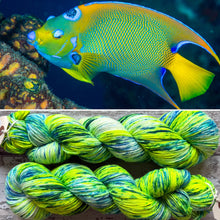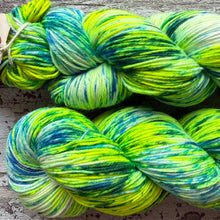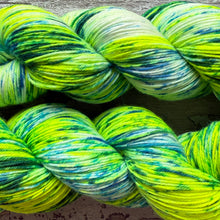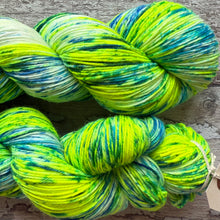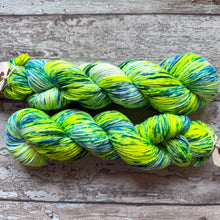
Superwash treated sock weight yarn with 75% merino wool for softness and warmth and 25% nylon for enhanced durability. It is suitable for approximately 2-3mm needles. About 420 metres per 100g skein. This yarn is presented as a skein. If you would like it caked then this paid-for service adds 24h to the dispatch time.
About the Fish
The queen angelfish (Holacanthus ciliaris) is a strikingly colourful reef fish native to the tropical waters of the Western Atlantic Ocean, ranging from Bermuda to Brazil, including the Caribbean. They are solitary, apart from during mating, being territorial and potentially aggressive towards other angelfish of similar size. Spawning occurs year-round, with males fertilizing eggs released by females into the water column.
Queen angelfish have a flattened, oval-shaped body with iridescent blue scales edged in yellow and a bright yellow tail. Their dorsal and anal fins are elongated, trailing behind their body, and their face is predominantly yellow with a cobalt-blue mouth. The “crown” on their forehead is an electric blue spot surrounded by a ring of darker blue. Despite their bold coloration, they blend seamlessly into the reef environment, which helps them evade predators.
Queen angelfish are shy yet curious creatures. Divers occasionally observe them approaching cautiously before retreating. Juveniles play an ecological role as “cleaners,” removing parasites from larger fish at cleaning stations. Their diet primarily consists of sponges but also includes tunicates, jellyfish, algae, corals, and plankton. Their omnivorous feeding habits contribute to the health of coral reef ecosystems.




